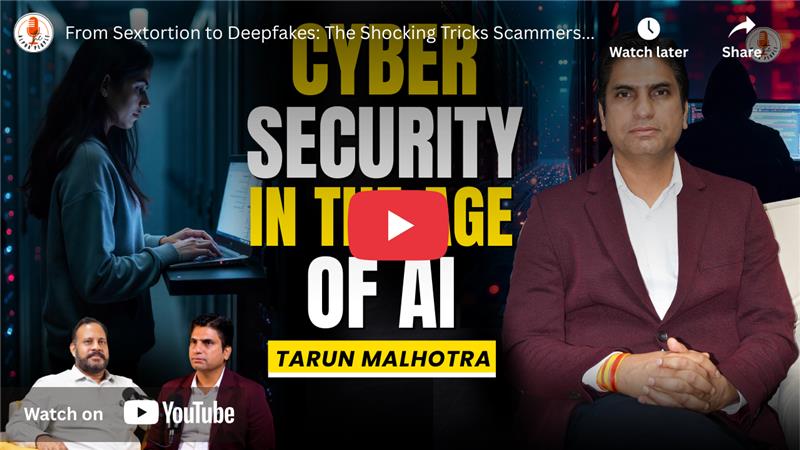The podcast, hosted by Naveen Kumar Verma with cyber security expert Tarun Malhotra, explores the fast-growing threats of cybercrime in today’s digital age. It begins with a clear explanation of what cyber security really means—not just data protection, but also personal, organizational, and even national-level safety. Tarun stresses that cybercrime impacts everyone, from school children to senior citizens, because criminals no longer only hack devices—they hack the human mind.
The discussion highlights how scammers manipulate psychology through fear, urgency, and greed. Fake police calls, digital arrest scams, “your account will be blocked” messages, or offers of cheap iPhones are all ways criminals trick people into acting without thinking. Real-world examples include sextortion cases, corporate wire transfer frauds, and UPI scams. Tarun emphasizes the importance of awareness, showing how even small mistakes—like clicking a spoof link or sharing mobile numbers carelessly—can compromise security.
Another key theme is the misuse of Artificial Intelligence. While AI tools like ChatGPT and Copilot are helping people, hackers are creating their own versions such as HackGPT and WormGPT to write realistic phishing emails, develop malware, and break security systems. Deepfakes and voice cloning have already tricked people into losing crores of rupees by showing fake videos of celebrities like Narayan Murthy, Shahrukh Khan, or Sadhguru endorsing scams. Tarun describes AI as a “knife”—useful for good, but equally dangerous in the wrong hands.
The conversation also dives into the dark web, where 96% of the internet lies hidden. It is a marketplace for stolen data, vulnerabilities, and even criminal services like human trafficking and contract killings. Tarun explains that much of the data leaked onto the dark web actually comes from everyday habits—sharing phone numbers at stores, filling unnecessary forms, or installing suspicious apps. He warns that mobile numbers and Aadhaar details are often sold in bulk for marketing or criminal use, sometimes as cheaply as ₹5,000 for 10 lakh records.
Through case studies, the expert illustrates how victims were targeted, how timely reporting saved money, and how delay can make recovery impossible. For example, a Delhi girl was blackmailed with morphed photos after installing a fake loan app, but quick reporting and device reset stopped the scam. In another case, a corporate firm lost money after receiving a spoofed email appearing to be from the CEO. Tarun stresses the importance of Zero Trust security: “Never trust, always verify.”
The episode concludes with practical advice—always report fraud immediately to the cybercrime helpline 1930 or cybercrime.gov.in, use VirusTotal.com to verify suspicious links, stop sharing personal numbers, and adopt strong cyber security frameworks. Most importantly, Tarun insists that awareness is the ultimate safeguard. As technology and AI continue to evolve, only informed and cautious users will be able to stay one step ahead of cybercriminals.
🔔 Don’t forget to subscribe & share if this conversation resonated with you!
🔔 Don’t forget to subscribe & share if this conversation resonated with you!
Frequently Asked Questions
Certainly! Here are some potential questions and answers based on the podcast conversation:
Cyber security is not only about data protection—it includes personal, organizational, national, and even global security. Every country is facing cyberattacks, and criminals target not just companies but also common people by exploiting their psychology. It’s about safeguarding information, finances, and even reputations.
They play with psychology using three main tactics: fear, urgency, and greed.
- Fear: Fake calls claiming your child is in police custody or your account is suspended.
- Urgency: Messages like “Do this now or your electricity will be cut.”
Greed: Unreal offers—iPhones at ₹10,000 or “double your money” schemes.
Hackers have created AI tools like HackGPT and WormGPT that generate realistic phishing emails, malware, and even bypass firewalls. They also use deepfakes and voice cloning to trick people with fake celebrity or relative videos. AI is like a knife—it can be used to prepare a meal or to kill; it depends on who holds it.
A girl in Delhi was blackmailed with morphed photos after installing a fake loan app. Scammers had stolen her contacts and pictures. She reported it quickly to 1930 (cybercrime helpline), disconnected the internet, reset her phone, and posted a message clarifying she was a victim. The scammers backed off because they don’t want legal trouble.
No. One company lost money when hackers sent a spoofed email pretending to be from the CEO, asking a client to transfer funds to a new account. Weak firewall settings and lack of endpoint detection made it possible. Proper configuration, EDR/XDR tools, and following frameworks like NIST, GDPR, HIPAA are critical for corporate safety.
Most of the time, we give it away ourselves. For example, at stores when asked for mobile numbers for billing, or when we upload Aadhaar/passport copies. These details often end up sold in the dark web, where ₹5,000 can buy data of 10 lakh people.
- Follow Zero Trust principle: Never trust, always verify.
- Stop sharing your phone number everywhere.
- Check suspicious links on VirusTotal.com.
- Report fraud immediately at 1930 or cybercrime.gov.in (within 72 hours for up to 90% recovery chances).
Always double-check domains, emails, and phone numbers before acting.
You receive a message saying ₹10,000 has been credited to your account. When you enter your PIN, instead of receiving money, the scammers withdraw it. It’s a trick using reverse engineering—showing fake credit while actually debiting your account.
Scammers pose as police or government officers, claiming your child or relative is involved in drugs or crime. They demand money to avoid legal action. Victims panic under fear and emotional pressure, often paying immediately without verifying.
Only 3–4% of the internet is visible to us (Google, Facebook, etc.), while the rest is deep and dark web. The dark web hosts illegal activities like drug trade, child pornography, contract killings, and massive data sales. Stolen phone numbers, Aadhaar details, or corporate vulnerabilities are openly sold there.
Report immediately. RBI and police advise reporting within 72 hours, but the sooner the better. If done on time, up to 90% of the money can be recovered. Delay allows scammers to move funds through multiple accounts and convert it into untraceable cryptocurrency.
VPNs and IP-based calling. Criminals hide their real location by routing traffic through other countries, making them untraceable. Only a few nations like Saudi Arabia have banned VPNs, but globally, it remains a loophole criminals exploit heavily.






